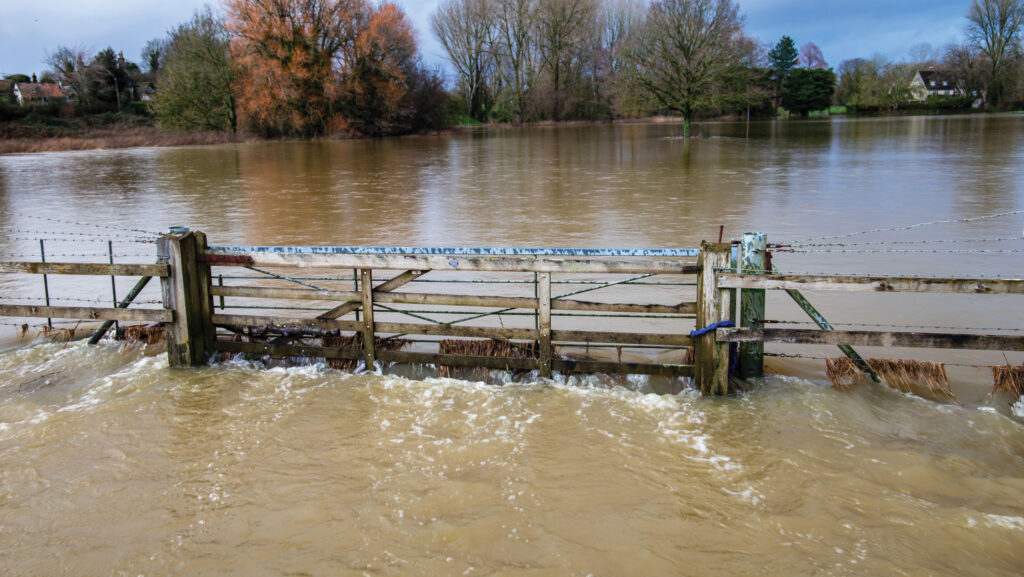Review of the Year 2024: Flooded fields to Atlantic crossings
 © Map Atlantic Dash
© Map Atlantic Dash From celebrations to commiserations – Farmers Weekly takes you through the A-Z of this year’s agricultural highs and lows. In our final article, we look at U-Z…
See also: Midlands farmers row the Atlantic and raise over £132,000
U is for “Under attack”
The whole poultry sector was on tenterhooks, watching closely a case brought by the Humane League which argued that Defra is acting illegally by allowing the use of fast-growing breeds in chicken production.
Rejected by the courts in 2023, an appeal case was heard in October, and thrown out again in December.
Anti-broiler farm campaigners also applied for a judicial review of a decision by Shropshire Council to approve four more sheds for broiler grower LJ Cooke & Son at Felton Butler, following a seven-year planning battle.
They say there is a real danger the River Severn will become as polluted as the River Wye if further poultry developments are allowed. The council says all environmental checks have been passed.
Fast food chain KFC also felt the wrath of animal rights protesters, with the Humane League demonstrating outside its head office in Woking.
The protest followed an admission by KFC that it would not be able to meet the Better Chicken Commitment by 2026, owing to the lack of slower-growing birds which signatories are obliged to use.
Just 3% of the stock in the UK currently features slower-growing birds.
V is for “Vanishing act”
The UK farming budget has been heavily impacted by the Treasury’s £22bn “blackhole”, with chancellor Rachel Reeves looking to find ways of filling it.
As well as the controversial plan to introduce 20% inheritance tax on farm assets over £1m, the government has announced drastic cuts to the Basic Payment Scheme (BPS) for English farmers.
Having already seen 50% of the value removed over the past three years, farmers were expecting a similar phase-out over the next three years.
Instead, they now face a 76% cut on the first £30,000 of BPS in 2025 – taking it down to £7,200 – and the total removal of BPS above that amount.
In another “vanishing act”, Defra admitted in September it had underspent the support budget by £357m over the past three years. Some £200m was added for the current financial year, but the remainder is nowhere to be seen.
Defra’s announcement in November that new capital grants are suspended has also set alarm bells ringing.
Meanwhile, Westminster has removed the ring-fenced guarantee for agricultural funding in Scotland, Wales and Northern Ireland, raising serious concerns in the devolved regions about their future financial support.
W is for “Wet, wet, wet”

Storm Henk unleashed torrential rain causing flooding © Mark Walker/Alamy Stock Photo
Just two days into the new year and Storm Henk unleashed its fury, decimating winter crops in southern and central parts of England and Wales, with torrential rain and damaging winds.
The unusually wet weather continued into the spring, leaving arable farmers unable to plant crops. For some, it meant the first season without a harvest since the end of the Second World War.
There was more to come in the autumn, when rain fell in volumes some described as “biblical” as it washed away freshly planted crops.
Some help was at hand in England in the form of the Farming Recovery Fund. Having initially pledged £2m in April, this was increased to £50m in May, to help flood-affected farmers repair the damage to their land.
By October, just £2.1m had been allocated, sparking fears the money might never see the light of day. However, by November, £57.5m had been paid out to 12,700 farm businesses, with payments ranging from £2,895 to £25,000.
X is for… X factor

Delight from Mark Means as he collects his FW Awards trophies © Telling Photography
This year’s set of deserving nominees for the Farmers Weekly Awards gathered at the Grosvenor House Hotel in Mayfair, London, in October for a welcome night of celebration.
It was a night that saw rugby referee-turned-farmer, Nigel Owens, named as Farming Champion, likening farming to refereeing – “unless you enjoy it, you just wouldn’t do it”.
Jeremy Moody, secretary and adviser to the Central Association of Agricultural Valuers, also found himself in the spotlight to pick up the Lifetime Achievement Award.
And then there were the farmers nominated in their respective industries (dairy, beef, sheep, poultry, and many more) – people at the top of their game and every one a winner – but especially arable farmer Mark Means, who was our overall Farmer of the Year.
Y is for “Yoof”
Farmers Weekly provoked a national conversation on how young women in rural areas are treated by men when it asked the question: “Is there a problem with young farmer culture?”
It seemed that there was, judging by some reports that emanated in May from the young farmers’ DIY AGM in Blackpool, an event run by the Young Farmers Community.
T-shirts emblazoned with inappropriate slogans had been printed and sold, and allegations emerged of groping, touching and other forms of sexual harassment.
The exposé empowered other girls to share their stories and momentum built around a campaign for change.
The National Federation of Young Farmers’ Clubs (NFYFC) was already taking action on engendering respect and inclusion, and it stepped up this work.
It strengthened the action it had been taking on these issues, as well as diversity, wellbeing, mental health, safeguarding, alcohol awareness, behaviour and conduct, and launched a survey to gain a better understanding of the situation.
The organisation has made it very clear that reporting sexual assault must always be regarded as “the norm”.
Z is for “Zebra fish”

Farmers Rod Adlington and Guy Minshull celebrate in Antigua with fellow crew – Lancashire vet Anna Williams and paratrooper Alex Perry © Map Atlantic Dash
Tenuous this one… but two Zebra fish tracked Midlands-based turkey farmer Rod Adlington and arable farmer Guy Minshull as they rowed across the Atlantic at the start of the year.
The journey took 53 days and they raised over £140,000 for two charities – Meningitis Now and Get A-head. Both oarsmen gained fitness and experienced weight loss on the crossing – as did the Zebra fish.
In other notable charity efforts this year, agriculture student Gillies Boyd, from Argyll, ran the Edinburgh marathon for Macmillan Cancer Support in a pair of wellies.
Somerset farmer Nick Bragg cycled 1,000 miles, accompanied by a forage harvester, for the Royal Agricultural Benevolent Institution.
Beef and sheep farmer Rhys Griffith cycled 326-miles from Barmouth to Great Yarmouth to raise funds for the DPJ Foundation and the Shire Horse Society.
Lincolnshire farmers James Caswell and Taron Lee drove a JCB Fastrac around the coast of Britain to raise money for the Farm Safety Foundation’s Mind Your Head campaign.
And the annual Pink Ladies’ Tractor Road Run in Suffolk raised £127,000 for Cancer Research UK’s breast cancer appeal.
